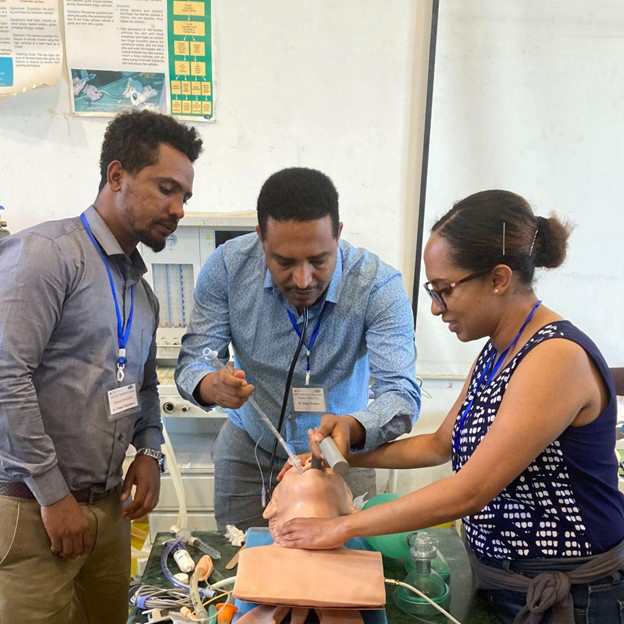Dr. George Abi Saad, Chief of COT Region 17 and ATLS Provider Course Director, welcomes the participants of the inaugural ATLS Provider Course.
Participant Demographics and Results
Eight emergency and critical care specialists, four orthopaedic surgeons, 14 general surgeons, one colorectal surgeon, and one plastic surgeon attended the inaugural ATLS Provider Courses. In this group, 28 participants passed the course, 16 were identified as having instructor potential, eight completed the ATLS instructor course, and four were certified as ATLS instructors.
The trainees represented eight of the 11 geographic regions of Ethiopia. All providers were attending physicians and financially supported by the FMOH.
Of the multiple factors that contributed to the success of this promulgation, the synchrony and rapport between surgical and emergency departments and across a diverse faculty and participant cohort were imperative.
ATLS faculty represented five countries across three continents and ranged from general surgical trainees participating as instructor candidates, to well-established senior surgeons with decades of experience in ATLS leadership.
Course participants, who traveled across the country to the Sidama region where Hawassa is located, came from colorectal, emergency and critical care, general, orthopaedic, and plastic surgery specialties. This diversity created a unique learning environment for continuous discussion across cultures, specialties, and clinical experience, both in and out of the classroom.
A condensed promulgation time frame was essential to implement the “train-the-trainer” educational model. As the majority of ATLS faculty traveled from outside Ethiopia, the timetable was structured to maximize their time in-country. This promulgation was the first time the ATLS Provider Course was taught to local healthcare providers in their home country within COT Region 17.
In prior COT Region 17 promulgations, the first batch of participants traveled internationally to complete provider and instructor courses before participating in their own country’s promulgation. This promulgation structure eliminated international travel for local participants and maximized the educational potential that could be provided by visiting faculty in a single trip.
Senior faculty of HUCSH General Surgery and ECC departments conduct the disability skills station, alongside ATLS faculty Dr. Chris Dodgion.
Financial Cost
The overall cost for the initial ATLS promulgation was approximately US$10,000, which was shared by the FMOH and HUCSH. The FMOH and HUCSH also supported the transportation and accommodation costs for course participants who traveled to Hawassa.
Air travel expenses for the international faculty traveling from the US, Egypt, Saudi Arabia, and Lebanon were supported through the Reilly Baldwin Wisconsin Idea Endowment. This grant, in association with multiple donations, also supported the acquisition of ATLS training equipment. ATLS course material and certification were supported by the COT.
Visa Challenges
The promulgation process was not without its challenges. Conflict across Ethiopia was ongoing at the time, highlighting the need for trauma system development and training. Unfortunately, HUCSH physician champions experienced some delays with visa acquisitions for international ATLS training. These delays lengthened the time to certify Dr. Tesfaye and Dr. Tadesse as instructors prior to proceeding with the initial ATLS promulgation in Ethiopia.
Visa acquisition also was challenging for ATLS faculty traveling from the Middle East. Despite planning several months in advance, Ethiopian visas for faculty traveling from Lebanon, Egypt, and Saudi Arabia were obtained only with a letter of invitation from the FMOH and with a slim time margin.
Dr. George Abi Saad and Dr. Emnet Tesfaye sign the Ethiopian ATLS memorandum of understanding.
Logistical Challenges
It was essential to select participants for initial ATLS certification who were experienced in the management of trauma patients. As such, the complex logistics of identifying trauma champions from across the country and coordinating their travel necessitated flexibility with final course rosters and agendas.
For some participants, this limited the availability of precourse material and the time they had to prepare. During the course, intermittent internet and electrical outages at the hospital site required that online educational material be downloaded prior to arrival and required faculty flexibility regarding temporary lapses in presentation visibility during the interactive discussions.
The participants of the second ATLS Provider Course, with newly certified Ethiopian ATLS instructors, ACS faculty, and a delegate of the FMOH, celebrate the conclusion of a successful ATLS promulgation.
Next Steps
To address the gap in trauma management, the FMOH has identified the need for ongoing provider training.
The Ethiopian National ATLS Committee plans to conduct the ATLS Provider Course at least three times per year. The number of courses could be increased depending on participant interest level and available financial resources.
Fundraising will continue to be a focal priority as the majority of physicians may struggle to afford the minimum course fee. To partially address this, continued collaboration with the FMOH is crucial, as the Ethiopian ATLS initiative aligns with their current 5-year plan to improve critical care capacity nationwide.
It is through this cooperative work with Ethiopian trauma care champions, FMOH, SSE, COT Region 17 leadership, and US collaborators, including OGB, that this course promulgation was possible.
While future dissemination plans are still in development, Ethiopia and HUCSH have emerged as leaders for trauma training at a crucial time in the region.
Note
Special thanks to the international ATLS faculty for their dedication to this project: Abdelhakim T. Elkholy, MD, FACS, Ahmad Zaghal, MD, MSc, FACS, Alliya S. Qazi, MD, Arielle Thomas, MD, MPH, MS, Emmanuel Abebrese MD, MS, Laura T. Withers, MD, and Nisreen Hamza Maghraby, MBBS, FRCPC(EM). Additionally, special thanks to Sharon M. Henry, MD, FACS, and Dany Westerband MD, FACS, for their guidance and support as Chairs of the International ATLS Committee for the COT.








